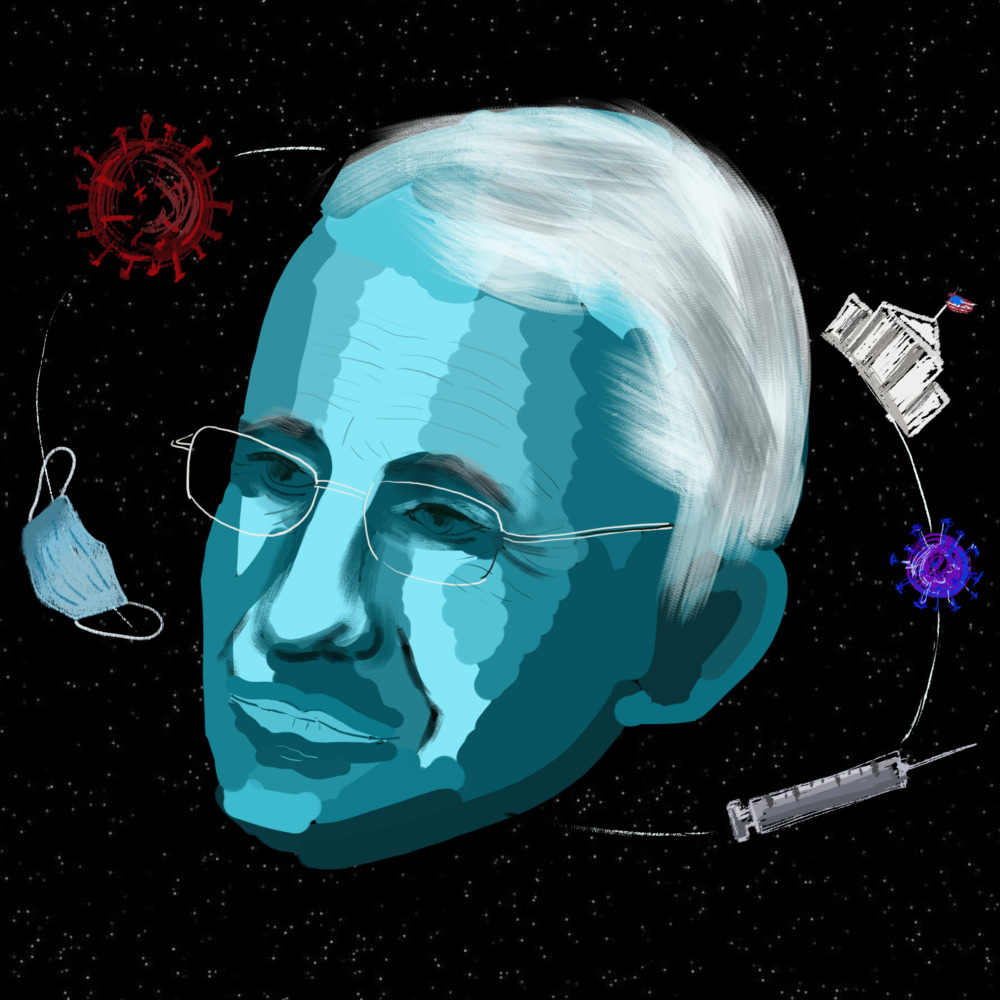Fauci Documentary Remembers AIDS
By Erin Blackwell
Dr. Anthony Fauci became a media darling when he rolled his eyes and face-palmed behind President Trump’s back during press conferences about the coronavirus outbreak in early 2020. People who hated Trump clasped Fauci to their bosom. That bilateral schism along political lines made Science hot. He was named Sexiest Man of the Year by People magazine. He and his wife were dubbed Science’s power couple. He was profiled celebrity-style by Vogue, CNN, CNBC, NPR, C-Span, The Guardian, InStyle, impersonated by Brad Pitt on SNL, and iconized on votive candles. Now comes National Geographic’s feature-length documentary Fauci, which opened at the intimate Vogue moviehouse on Sacramento Street, September 10.
John Hoffman, who co-directed the film, is a veteran documentarian six of whose health-related films have been produced by the National Institute of Health (NIH). Co-director Janet Tobias’ 2017 film on the Zika, Ebola, and influenza viruses, “Unseen Enemy” was presented on CNN by Johnson & Johnson. They’ve shot and compiled a strangely muted film from Fauci’s p.o.v., with no hard questions, no scientific debate. You won’t catch new insights into the virus SARS-CoV-2 (severe acute respiratory coronavirus 2), the disease it causes, or the injections that were supposed to stop it. The 144-minute runtime is devoted to Fauci’s siege mentality, his family, a brief biographical sketch, and selected highpoints in an ambitious workaholic’s career. Pride of place is given to memories and archival footage of the AIDS epidemic that catapulted young Tony Fauci in 1984 into the driver’s seat at the National Institute of Allergies and Infectious Diseases (NIAID), where he yet reigns.

Early in the film a split screen shows the 80-year-old doctor and his 45-year-old self treading the same pathway to work, opening the same door, waiting in the same elevator, walking down the same hall, and entering the same office to type on different computer keyboards. Fauci had become media-worthy for his involvement with AIDS (Acquired Immune Deficiency Syndrome). Reading the first reports of PCP and Kaposi’s Sarcoma in young gay men, Fauci sensed it was a new disease. “I got goosebumps.” Unabashedly careerist, he says, “I’d been trained as an infectious disease doctor and immunologist. I was made for this disease!” Gay male activists from the HIV virus crisis days David Barr, Michael Manganiello, Robert Pacheco, Peter Staley, and Wakefield are crisply filmed bearing witness to Fauci’s beneficence to a devastated community ostracized by homophobes.
Staley, the activist who gets the most screen time, fondly characterizes the NIAID chief as “the short man in a white coat.” Recalling Fauci’s willingness to sit in on a roomful of ACT-UP activists hurling criticism and complaint, Staley says, “This was Brooklyn.” He means that Fauci’s home-borough trained its young in street fights. It’s a key insight into the Rona Tsar’s tough guy intransigence when cornered and his aura of infallibility, even when changing his story. For the camera, he again re-explains why he lied about the efficacy of masks in stopping SARS-2 transmission, and it makes even less sense this time around.
“I’m the bad guy to an entire subset of people,” Fauci says with wistful defiance. “Because I represent something that is uncomfortable for them. It’s called the Truth.” I hope for his sake he doesn’t actually believe this dogmatic self-description, but I’m curious who’s in his subset. The doctors saving people’s lives with ivermectin, quercetin, vitamin C and D, zinc? Vaccinologist Dr. Robert Malone, who warns excessive vaccination dilutes vaccine efficacy and could disable human immune response? Sharon Lerner and Mara Hvistendahl, reporters analyzing 900 pages of NIH documents The Intercept obtained through the Freedom of Information Act? Senator Paul Rand, who grilled him in Congress over NIH funding of the Wuhan Institute of Virology’s gain-of-function research into bat coronaviruses? Nikki Minaj, who took a stand for an individual’s right to refuse a vaccine?
Never mind them. At film’s end, over a driving trumpet solo in descending scales, Fauci muses in his signature gravelly whisper: “I hope that if historians look back — if they would ever want to look back — at what I’ve done in my life, maybe somebody says, ‘Hey, that guy was pretty good.’”
